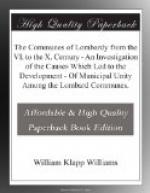[36:] From Otto of Freising, De Gest. Freder., Lib I., cap. 31, we know that the same distribution took place in Hungary, which was divided into seventy comitates; “et de omni justitia ad Fiscum Regium duas lucri partes cedere, tertiam tantum Comiti remanere.”
[37:] Charlemagne: Leg. Lomb. Nos. 127 and 128.
[38:] Lex No. 128.
[39:] Muratori: Diss. Ant. Ital. Dissert. VIII., Tom. I., P. I., p. 96.
[40:] Muratori: Script. Rer. Ital., Tom. II., Pars II.
[41:] In illustration of this fact I will cite the names of some of the various taxes, dues and privileges, mention of which is found in the old documents. The feudal character of these will be apparent to the reader. Following the rough division indicated in the text, we have:
I. Under heading “Fines and Forfeitures”:
1. Forfaturae:
Forisfacturae,
Multae
(Mulcte),
Freda,
e.g. Leudis
(Leudum) for homicide.
Penalties and compositions
for crime.
2. Scadentiae:
Excadentia,
Bona
caduca.
Publicum falls
heir to various classes of individuals. Cf.
Leg.
Rhotari,
No. 158 et al.
3. Lagan (Laganum).
Seizure of shipwrecked
goods by the state. Examples more
common after
year 1000 A. D.
II. Under the head of “Taxes and Privileges”:
1. Onera Publica, or Angariae (Perangariae),
Factiones publicae.
a. Heribannum:
Penalty for avoidance of military service.
Cf.
Charlemagne, Leges, No. 23 et al.
b. Heribergum:
Hospitality to Missi of emperor or king.
Cf.
Charlemagne,
Leges, No. 128 et al.
c. Mansionaticum
(Mansiones, Evectio): Lodging for king and
his
ministers.
Conjectum was a pro
rata tax on a district so as to meet the
expense.
Cf. Lud. Pius, Leg. Nos. 54, 24, et
al. loc.
Tractoria gave specification
of what should be provided in each
case. For Formula,
v. Marcolfo, Lib. I.
d. Veredi
(Paraveredi): Horses and beasts of burden for
king
and ministers.
Cf. in Capitular. Reg. Franc. saepe.
Capit.
Lud.
II., Ad Missos, etc.
Census vehicularius,
fiscalis or publicus was post to carry, free
of expense,
king’s letters, etc.
e. Foderum
(Fodrum): Support of a king and his army in
passing
through a district. Cf. many privileges and exemptions
to different
churches and monasteries. Articles of the Peace
of
Constance.
Some privileges to private persons.




